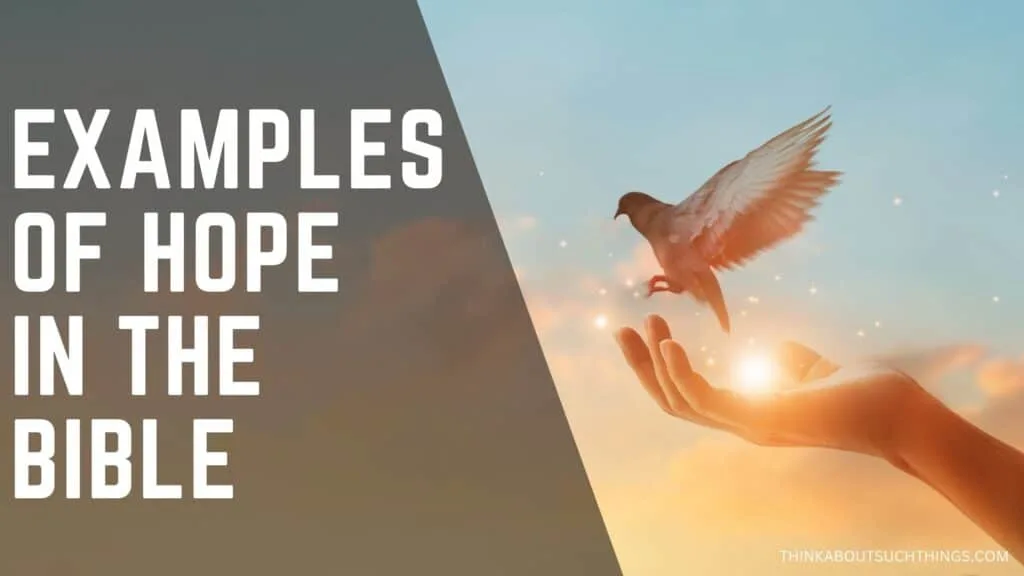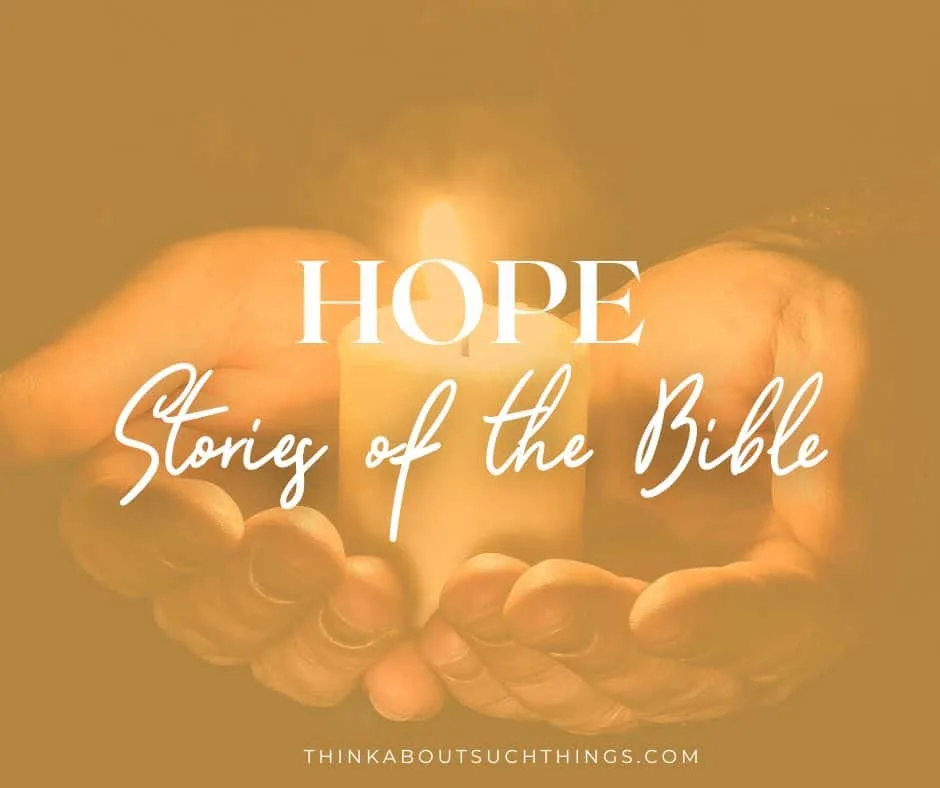In this article, we will look at some Bible stories about hope and how these stories stir out faith and trust in the Lord. So, grab your Bible, and let’s jump in…
Our modern society is fast-paced, and we have developed the expectation that things need to happen instantly. I mean, we have microwaves and fast food; we don’t even need to pick up a book to look something up; we can google it. Everything is at hyper speed.
This was not always the case. The Bible is full of accounts where many years lapsed between a promise and the fulfillment of the promise. What has made people cling to promises for years while waiting for an outcome? The answer to this question lies in hope.
Today, we use the word hope very differently than the Greek and Hebrew definitions of hope in the Bible. Hope is almost a flippant statement of chance.
This is not how the Bible describes hope. We find three words for hope in the Hebrew text and two in the Greek text.

Table of Contents
What Does The Bible Say About Hope?
The Hebrew words for hope are qāvâ, yāḥal, and tiqvâ. These words translate to waiting expectantly, as in Isaiah 40:31, where those who wait upon the LORD will have their strength renewed.
In Job 13:15, the word yāḥal is translated as trust. In Joshua 2:18, we read that Rahab was to put a cord out her window during Jericho’s destruction. The red cord tied Rahab’s trust and hope to the spies’ promise.
In Hebrew, we associate hope with waiting with a sense of expectation and trust in a positive outcome. Hope is not a whim. Hope is something that binds you to a promise.
STRONG’S CONCORDANCE ON HOPE (HEBREW)
קָוָה qâvâh, kaw-vaw’; a primitive root; to bind together (perhaps by twisting), i.e. collect; (figuratively) to expect:—gather (together), look, patiently, tarry, wait (for, on, upon).
יָחַל yâchal, yaw-chal’; a primitive root; to wait; by implication, to be patient, hope:—(cause to, have, make to) hope, be pained, stay, tarry, trust, wait.
תִּקְוָה tiqvâh, tik-vaw’; from H6960; (compare H6961) literally a cord (as an attachment); figuratively, expectancy:—expectation(-ted), hope, live, thing that I long for.
The Greek words for hope in the new testament are elpis and elpizō. These words translate to waiting in trust and a joyful and confident expectation. We see the subtle distinction between these two words in Romans 8:24-25 where Paul uses both these words.
STRONG’S CONCORDANCE ON HOPE (GREEK)
ἐλπίζω elpízō, el-pid’-zo; from G1680; to expect or confide:—(have, thing) hope(-d) (for), trust.
ἐλπίς elpís, el-pece’; from a primary ἔλπω élpō (to anticipate, usually with pleasure); expectation (abstractly or concretely) or confidence:—faith, hope.
So, hope in the Bible is a matter of steadfast belief in a fulfilled promise. It entails trust, patience, and joyful anticipation. Let us learn more about how we apply hope in our lives by looking at the examples set in the Bible.
Bible Stories About Hope

Rahab’s Red Cord Of Hope
With the entrance of the Israelites into the promised land, the inhabitants of Canaan had heard many stories about them. They heard how God had performed miracles on behalf of His people, and they were terrified.
They heard about the Egyptian army’s defeat and the destruction of two Amorite kings. The king of Jericho must have felt rather hopeless in the face of the Israelite nation encamped near his city.
In the face of these overwhelming odds, one woman believed in the God of heaven and earth and set out to align herself with the Israelites. She hoped to be spared the fate of those who opposed the Israelites.
Rahab’s hope was not a whim. She acted and provided shelter to the two Israelite spies. Rahab also helped them escape, but not before she declared her faith in God and asked to be spared.
The spies had no idea what God’s plan was to take the city, yet they promised to save Rahab and her family. As a token of this promise, Rahab needed to hang a red cord from her window. That piece of cord was her steadfast hope and belief in the promise to save her life. Her hope was no small thing, and it was rewarded as only her family was spared when Jericho was destroyed.
Job Had Both Patience And Hope
We may be familiar with the events in the book of Job. Job lived an upright life and had many sons and daughters. He had accumulated large herds and flocks. Satan was sure Job would turn his back on God once he lost his material comforts and wealth. But satan was wrong. Despite losing everything, Job remained faithful.
Surely, he would turn his back on God if his health was removed! No Job remained steadfast in his faith. What allowed Job to remain grounded in his faith even when he was covered in sores and his wife and friends turned on him?
The answer lies in the hope that Job had in God’s faithfulness. The three Hebrew words for hope appear twenty-five times in the book of Job.
Despite losing every material comfort, Job never lost hope. Hope is affirmed each time we have hoped for an outcome, and God was faithful in letting it come to pass. Job knew that God had been faithful to him in the past.
Therefore he knew that God would be faithful again in the future. We see patience in Job as an expectant, waiting, and trusting kind of hope that was fully rewarded.
Abram, Became Abraham By Believing God’s Word
When we go through some trails, we can easily lose hope. We know that Abraham and Sarah waited for twenty-five years for Isaak to be born, and that is a long time to keep hoping and stand on a promise. The situation is even bigger, though. Abram and Sarai were both past the age when they could naturally conceive. They had waited for a child almost their entire life.
God changed their names as a confirmation of his promise. Abram went from an exalted father to Abraham, a father of many. Each time anyone spoke his name, God’s promise was confirmed to keep Abraham’s hope alive.
Despite the dire situation, Abraham believed in God’s promise. Abraham did not lose hope of having a child. We learn from Abraham’s account that we do not need to intercede and attempt to help God’s plan along. Even if it takes twenty-five years, God is faithful, and His timing is perfect.
David’s Hope Stayed Steadfast For Fifteen Years

David was not esteemed among his brothers. He was the youngest son in the family and nothing but a shepherd boy when Samuel visited his father, Jesse. David was just a boy when Samuel anointed him as the next king of Israel. Many may have become proud and boastful, but not David.
David returned to tending the flock and singing songs to the LORD. David built his faith in God while he was a shepherd to have a steadfast expectation and trust in God when he challenged the giant. Saul persecuted David for many years, but David remained hopeful that God’s Word would come to pass.
We know this because there are no fewer than forty accounts of the words for hope in the Psalms penned by David. In Psalm 25, we see the word wait three times. The Hebrew here refers to expectant hope. Though fifteen years elapsed from the day Samuel anointed David king until his coronation, David’s steadfast hope was in God.
Jesus, Our Eternal Hope
To them God willed to make known what are the riches of the glory of this mystery among the Gentiles: which is Christ in you, the hope of glory. – Colossians 1:27
God gives us many stories of hope throughout His Word. He does that to build our hope. You see, the entire Bible explains how God is working to restore a relationship with mankind. Paul speaks about hope more than sixty times in reference to Jesus being our salvation. We hope for a future with God because of what Jesus did for us.
In 1 Timothy 1:1, Paul states that Jesus is our hope. Paul also reminds us that our eyes should be on an eternal prize, not earthly challenges. In Colossians 1:27, Paul explains that because of our Savior’s finished work on the cross, we now have the hope of a future spent with Him.
Jesus makes us a promise in person when He tells us that He will prepare a place for us and that He will return so that we may be together for eternity. When life seems to be getting us down, we have God’s firm assurance of something far better to come. God loves us so much that He sent His Son so we would not lose hope.
The Bible contains examples of hope, so we may develop a firm, expectant, and joyful hope! Hallelujah!
If you want to leave me a comment, you can drop one below. I would love to hear from you and what God is teaching you!

Melissa is a passionate minister, speaker and an ongoing learner of the Bible. She has been involved in church and vocational ministry for over 18 years. And is the founder of Think About Such Things. She has the heart to equip the saints by helping them get into the Word of God and fall more in love with Jesus. She also enjoys family, cooking, and reading.
She has spoken in churches in California, Oregon, Texas, and Mexico and has been featured in Guidepost Magazine and All Recipes Magazine. Read More…
